To ascertain the effectiveness of the Basic Health Care Provision Fund (BHCPF), a Federal Government intervention fund for primary health care in the country, OLADEJO ADEBAYO went undercover in some local government areas in Ogun State, being one of the states benefiting from BHCPF. In this report, he uncovered how shortage of health personnel, poor infrastructure, lack of awareness and government insincerity, among others, affect the provision of basic healthcare and midwives services to the people of the state.
The smell of drugs, and the noise from the diesel-powered generator being used by the Nigerian Police Post, Kuto, filled the waiting room/reception of the Kuto Primary Health Centre (PHC) Abeokuta which occupies the ground floor of the storey building. Beside the door that leads into the drug room, a middle-aged woman sat on a plastic chair, head buried in the exercise book on the table in front of her.
Sitting opposite her was an unkempt-looking young woman, anger and frustration written on her face. Beside her on the left-hand side, a frail-looking old woman identified as Mrs Abibat Bello, possibly in her 80s, sat on a chair in anticipation of being summoned to receive medical attention. Somewhere at the corner of the room, sat two young ladies who accompanied the old woman.
“Mama, what do you want, and how exactly are you feeling?” the middle-aged woman, Mrs Temitope Musediq, a health worker by qualification who has been busy with the exercise book in front of her, queried. Thereafter, she ordered another young lady in casual clothes, who had no hand gloves, nor any PPEs, to examine the old woman.
After the examination which took barely three minutes, she was diagnosed with high blood pressure and some other conditions like high blood sugar and increased stress levels. She was thereafter counselled and under two minutes, a bill of N5,000 was handed over to her child who accompanied her to the health centre. The lady in turn put a call through to another family member, requesting N7,000 to pay her medical, to the amazement of the health personnel at the centre.
Asked by this reporter why the poor old woman had to cough out such an amount for accessing healthcare despite the implementation of the Basic Health Care Provision Fund (BHCPF), a Federal Government intervention fund for primary health care in the country, Mrs Musediq said the centre only has access to the basic healthcare drugs, but none of the residents of the community, young and old, vulnerable or not, is enrolled into the state health insurance scheme, denying thousands of the residents' opportunity to enjoy what other residents of the state do.
In an emotion-laden voice, the old woman said, “I am hearing about the basic healthcare scheme for the first time. I have been coming to this centre for some time now, and I have never enjoyed any extra benefit as I pay for the services as everyone else does.”
The Kuto PHC is not in good shape despite its enlistment as a recipient of the Federal Government’s Basic Healthcare Provision Funds (BHCPF) scheme. Six months after Ogun State began the implementation of the fund; there is no visible impact of the scheme at the centre.
According to the Officer –In- Charge of the Centre, Mrs Awojobi Balikis Temitayo healthcare is only subsidised in the facility not free.
“We don’t have enrollees for the Insurance Scheme here, but what we do here is that people can only come to the centre, access healthcare and buy drugs at a subsidized rate as we have no access to free healthcare.
The Primary Health Centre forms an integral part of the country’s health system and it is the first level of contact for individuals, the family, and the community with the Nigerian health system. Being the grass-root health facility, most patients are closer to them than the secondary health facilities.
The status of the PHCs in Ogun State
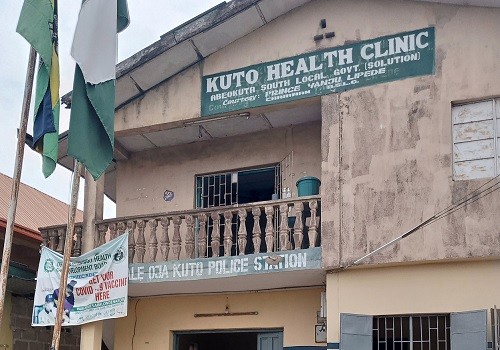
A visit by this reporter to some of the health centres in some local government areas, including Ijebu North/East; Odogbolu; Obafemi-Owode; Abeokuta South and Ewekoro revealed that the majority of the PHCs, especially in rural areas, are inadequately prepared to care for the health needs of the inhabitants. Some of the health facilities have their facility heads such as ward attendants often acting as nurses and Community Health Extension Workers (CHEW). Few of the facilities have qualified matrons, while many are understaffed.
It was observed that these ward attendants administered treatments based on the knowledge they have gained from professional health workers over time. Findings revealed that scores of the facilities, mostly located in the cities are averagely equipped, while others lack basic equipment and instruments needed in a standard PHC.
The reporter observed that health workers in the PHCs visited were not adequately dressed in uniform, as the majority of them were in casual wears. In some PHCs, staff attend to patients without PPEs or any means of protection.
During interviews with some of the health workers, most of them shared their concerns over the preparedness of their centres for serious health challenges. They also admit that they feel fatigued and worn-out as a result of understaffing, while many feel discouraged by the working condition as well as poor remuneration.
Patients and their fate
Most times, patients are delayed due to inadequate manpower in the facilities. Ideally, a facility should have a doctor, nurse, Community Health Extension Workers (CHEW) and ward attendants. It was, however, observed that most health facilities have either one or two domestic workers to oversee a facility with only one health worker. Patients, therefore, resort to patronizing patent medicine stores available in their areas.
Residents’ reactions
Our reporter spoke with some of the residents in the local governments on the activities of the PHCs, and the implementation of the BHCPF. Most people claimed that the health facilities are not well equipped. In contrast, many argued that the ongoing health insurance scheme initiated by the state government under the Ogun State Health Insurance Agency (OGSHIA), and the BHCPF are not properly distributed.
Reactions from health workers
Confiding in the reporter, a health officer in one of the PHCs said: “They now have low patronage in the facility reason being that majority are not aware of the basic healthcare scheme of the Federal Government as well as the intervention of the state government, adding that majority patronises drug vendors as well as alternative healthcare practitioners.
“We now have low patronage reason is that most rural dwellers who patronise our health facility have stopped coming due to lack of awareness. Most residents end up opting for treatments in private clinics comparing their efficiency based on the service rendered.
“It is important for the Ogun State Government to rise and address the dilapidated state of the PHCs in the state. The health of a large member of society depends on it. The facilities need more manpower and health equipment. Again, as it is done in the advanced world, the government should endeavour to provide necessary tools that are needed for the protection of health workers in the PHCs.”
What government has done so far
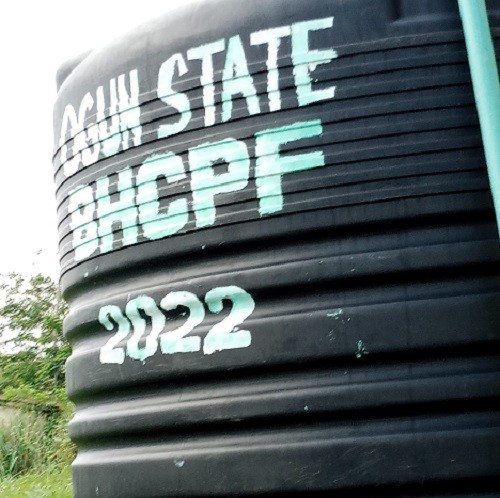
The Ogun State Government some months ago launched a Health Insurance Scheme for the informal sector of the state economy, as the government said it has paid up a total sum of N200 million grant to the Basic Health Care Provision Fund as part of its resolve to take advantage of the health scheme in the state.
The state governor, Mr Dapo Abiodun, during the formal take-off of the health insurance scheme said it was another step towards capturing the all-important sector in social health safety.
Abiodun said: “While our administration will continue to ensure that affordable and sustainable health care delivery system is provided in Ogun State, it is also imperative that we make it easily accessible to all our people.
“It is for this reason that we are gathered here today to launch the BHCPF as an effective gateway to the Universal Health Coverage (UHC) and the formal take-off of Informal Sector Health Insurance Scheme towards improving the wellbeing, wellness and welfare of the people of Ogun State.
“The BHCPF is a social health intervention fund that is targeted at providing basic health care services to the vulnerable crop of people – such as pregnant women and children under-5, as well as the indigent people in the society.
“Let me assure you that with the formal launch of BHCPF, the basic health care services will be provided to these categories of people that have been registered by the Ogun State Health Insurance Agency at no cost.”
He explained that basic healthcare services without exposure to financial hardships by the vulnerable in society necessitated the informal sector health insurance scheme.
He expressed hope that the scheme would serve as a cushion against any financial burden occasioned by high out-of-pocket expenses on health care services.
Uninhabitable PHCs in Ogun State
It was gathered that the building project meant for a new health centre for the people of the Ala community has reached the foundation stage, but the site was not revealed to this reporter. Meanwhile, the present location of the health centre is used is a portion of the community hall and it has been like that for years.
While inspecting the makeshift health centre, one could see cracked walls, damaged hospital beds, cabinets, littered floors, rotten windows, a stuffy and uninhabitable general ward, as well as frames dented due to severe weather conditions. Aside from these, there were also very dirty latrine, dirty single bathrooms, and hospital equipment completely covered with clouds of dust among others. The two staff available appeared weak and unbothered and the matron was casually dressed. The PHC is openly accessible without any form of security in place.
The experience of residents in the Ala community was pathetic, as the aspirations and expectations of these underprivileged rural dwellers seemed dashed as there are no indications that people consider the health centre fit enough for their healthcare needs. Donated items from Hon. Kolapo Osunsanya, a member of the House of Representatives representing Ijebu Ode/Dongola/Ijebu North East constituency in the 9th National Assembly, including tables, fans among others are wasting away in a poorly arranged waiting hall already damaged by dust and moist.
All efforts to reach the House of Reps member did not yield any result and phone calls to him were not answered, but it was gathered that he donated health care materials to all the Primary Healthcare Centres in the constituency, out of which many are poorly managed.
Officer In Charge of the Ala PHC, Mrs Ajimot Ajoke Ayodele, said they had to manage the facility and still take delivery of pregnant women in one of the dim-lighted and poorly ventilated small rooms at the centre. The general ward is so small that it could hardly take a handful of people at a time.
“Pregnant women from the neighbouring villages come around and we often make use of the small rooms in the centre, sizeable enough to be a kitchen store for child delivery,” she said.
The OIC was on casual cloth and had no PPEs to indicate that she is a health worker, while the other two staff were in a room set aside for patients as there were none around at the time this reporter visited the centre.
During a phone call with this reporter, the WDC chairman, Alh. Ganiyu Bello noted that the community has suffered a lot in the aspect of healthcare adding that effort is ongoing to ensure that the only health centre serving the community wears a new look as the new centre is presently under construction.
Residents lament over the unfriendly attitude of healthcare workers
Residents of Owode, under Obafemi/Owode Local Government Area and surrounding communities, who could not cope with the attitude of the healthcare workers towards patients are forced to patronize charlatans, traditional ‘doctors’ and ‘mid-wives’ whose ‘professionalism’ is well advertised in the communities. And when it results in deaths and sickness, as it most often does, it is attributed to some ill fortune or divine destiny.
Mujibat Abdulrasaq, a 35-year-old mother suffering from malaria, told Pharmanews that she made several visits to the Centre at Owode, only to hear the same words each time – “Come back another time, the drugs are not available now”.
“They either tell you to come back tomorrow or next week to get the drug, even with your basic card, and there is no assurance that if you come back the next day, you will be lucky to get the drug,” she said.
Pharmanews checks show that some of the cards for the enrollees are still at the centre, yet to be picked up. An enrollee, four-year-old Aliyah Abiodun, has been taken to the centre several times only to be told the same thing ‘no drug’. The major worry of Aliyah’s mum, Mrs Mujibat Abiodun, is that her several attempts to meet with the matron and explain her ordeal have been unsuccessful.
Mrs Abiodun further narrated that many residents have lost interest in going to the PHC because their attempts in the past have yielded no fruit.
“When they brought the card, the procedure to collect it was tedious, but since we received the card, we have not benefited anything from it. We have resorted to self-help, either by patronizing the local herb seller or a drug vendor at lower cost”.
Govt blames corruption on overzealousness on the part of PHCs
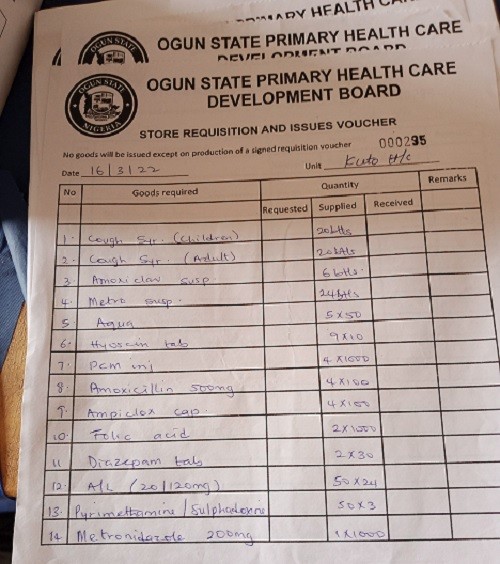
Reacting to some of our findings, Dr Ogunsola Ayowole Elijah, executive secretary of Ogun State Primary Health Care Board (PCB) attributed the issue of alleged corruption regarding the sale of drugs meant for basic healthcare schemes at prices above the rate approved by the agency as an act overzealousness on the part of the PHCs officials concerned. According to him, the agency is on the lookout for such PHCs.
Speaking on the measures the agency has put into place to ensure accountability and transparency, he said “We have a monitoring team and our monitoring team are in two folds. We have programmatic monitors and the financial monitors and our auditors and accountants were in four local governments, Ewekoro, Abeokuta South, Abeokuta North, and Odeda Local Government Areas and they are going to others soon”, he said.
The National Health Act made provisions for the Basic Health Care Provision Fund (BHCPF) as a Federal Government intervention fund for primary health care. It is an intervention fund because, according to the Constitution of the Federal Republic of Nigeria, local and state governments are responsible for the management, administration, and day-to-day operations of primary health care. Therefore, anything the Federal Government does about primary healthcare is an intervention to assist the states in providing high-quality healthcare at the basic level.
The Act stipulates that one per cent of the Government’s Consolidated Revenue Fund (CRF) will be dedicated to the Basic Health Care Provision Fund (BHCPF). It also outlines the administrative and accountability frameworks to ensure that the fund is properly managed by the three gateways and adequately utilized by primary healthcare facilities.
In an interview with this reporter, the Commissioner for Health, Ogun State, Dr Tomi Coker, noted that the Governor Dapo Abiodun – led administration remains focused on the well-being of the citizenry, saying despite the myriad of challenges and liabilities the government inherited, one of the areas where proactive measures and painstaking efforts have been made to turn around the fortunes of the state for better is the health sector.
She said the administration has zero tolerance for poor health care experience and services, adding that the state government had provided a monthly running cost for the health facilities across the 236 wards.
According to her, the Health Insurance Scheme was launched to further strengthen the health care system for the vulnerable groups across the 20 LGAs of the state.
She said the Ogun State Health Insurance Agency has accredited 236 primary health care facilities using the National Health Insurance Scheme (NHIS) guidelines, while funds have been disbursed into the State Treasury Single Account (TSA) at the Central Bank of Nigeria. She added that a total number of 26,440 beneficiaries have also been enrolled on the programme across the 20 local government areas of Ogun State.
She noted that the state has 196 PHCs that are under the Basic health care provision scheme at the moment but intend to make them 236 soon. “We have some of them that have not met the criteria to register patients for insurance when we went round registering the PHCs across the state. The people on insurance get free drugs without paying kobo, the enrollees include the aged, the vulnerable and the indigents. They are not meant to pay a dime, but we have some PHCs that offer only basic but no insurance, what it means is that they sell drugs at a highly subsidized rate.
“All the PHCs are available to the general public, but the ones that are not under state insurance are not free, as people can go there, access healthcare, buy drugs as the case may be and pay for the drug. However, those drugs must be cheaper than what is obtainable outside because we provided them at a highly reduced rate. So the charge is not from the mainstream, we provided them at a very reduced rate. So If there is any centre that is selling the drugs above the approved subsidized rate, I will be ready to visit them and make a scapegoat of them, because this government won’t tolerate any act of corruption,” she added.
Worn out bed and beddings at so many PHCs
Even other items as basic as beds, insecticide-treated nets and couches are in very short supply at some of the visited centres. It was almost not surprising that there was no adequate storage for the drugs at the Centres. The PHCs also lack well-equipped laboratories, suction machines for new babies and other equipment needed in standard health facilities.
It is generally believed that the prevailing lack of critical requirements in health facilities in the primary health centres results in steady grave consequences for the people. However, there are scores of health centres, especially those that have undergone renovation by the government as well as a few that are situated in the cities, or close to the seat of government that look averagely befitting and have some medical equipment.
However, out of about 25 PHCs visited across five local Government Areas of the state, only about eight including Elere, Oke-Ilewo, Erunbe, Mobalufon, Ofada, Ososa, Saraki/Adigbe, and Odogbolu, have a befitting building expected of a primary healthcare centre.
At Itamarun PHC, the general ward has only two good beds, about three worn-out beds and some abandoned mattresses, while the net on the windows is either torn or has been completely removed. “We don’t have an emergency vehicle and we are exposed to so many security risks,” top health personnel at the health centre told this reporter. The situation was the same at other PHCs like Odoregbe, Ibido, Ala, Ajegunle, Kuto and many others visited in the course of this investigation.
Scarcity of water plagues the majority of the primary health centres
Most of the Primary health care facilities under this investigation in Abeokuta South, Ewekoro, Odogbolu, Obafemi/Owode, and Ijebu North East Local Government Area are facing water supply problems due to the malfunction of their generator, epileptic power supply and which impacted patients’ experience, particularly the staff of the facilities and the expectant mothers.
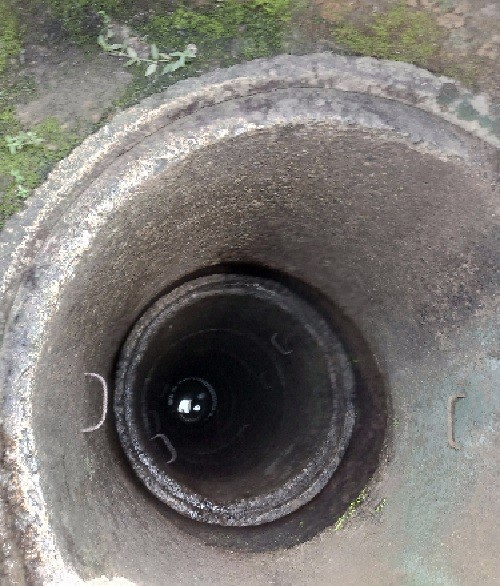
Investigations reveal that a 5,000 litres capacity water tanker, now sells for between N10, 000 and N`15, 000 depending on the location of the buyer. The worse hit is the primary health centres in the aforementioned local governments as many of them lack functional borehole facilities and public water systems.
A visit to primary health care centres in Odogbolu, Ewekoro, and even Abeokuta South revealed that health workers at the facilities are saddled with the responsibility to fetch water from a nearby well, in the case where the water tanker fails to deliver.
One of the affected healthcare workers, Idayat, surname withheld, who spoke on the condition of anonymity lamented the stress patients, health workers and family members of patients go through to get potable water.
Baale of Odoregbe, Ijebu North/East Local Government, Chief Nasiru Rufai complained that the local well that was sunk at the centre of the town is a major source of getting water in the community, adding that the only alternative to it is the borehole in his compound which also serve the community as well as the health centre whenever he pumped the water for them.
He said the government pipe-borne water that passes through the community is not reliable as it doesn’t flow well or sometimes doesn’t flow at all. Corroborating him, the Matron of the health centre, Mrs Temilade Adeyinka Adetimirin, noted that the centre spends close to 15, 000 monthly to buy water from the tankers, adding that the centre cannot operate without drinkable and hygienic water.
The situation was the same at centres like Kuto, Saraki/Adigbe, Ajegunle, Elere, Ibido, Idowa, Ala, and many other PHCs
Demoralized workforce
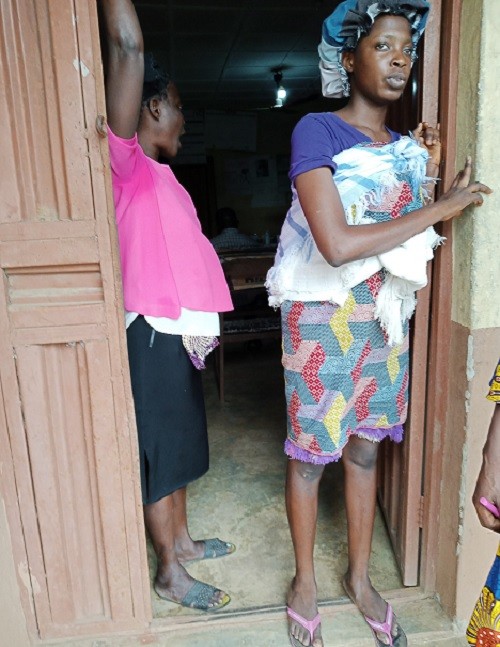
In the health, facilities visited, while patients voiced their frustration about the lack of awareness about the basic healthcare provision of the government, staff, especially those employed for the BHCPF, complained of doing more than they are paid. One personnel explained, “the high number of patients looking for the attention of few workers who are stretched and overworked is a major problem”
The standard practice at most health centres that the ad-hoc staff who may or may not have a background in health have to join in offering healthcare services is highly unprofessional and dangerous. For instance, the two ad-hoc staff, which include a desk officer and another health worker as provided by the basic healthcare scheme mostly make up for the shortage in many health centres, and they are mostly forced to do other work, not originally meant for them, including the night shift.
“This is discouraging and tiresome, having to work as all in all in the health centre, an officer in charge, the matron, a midwife, the ward vocal person, and when immunization comes, you still have to participate. This increases the challenge of wrong diagnosis and absenteeism as the case may be,” a midwife in one of the health centres under the Ijebu-Ode North East lamented.
Another health worker, who also doubled as the desk officer for the Basic Healthcare Scheme at a health centre in Abeokuta South confided in the ICIR that “the remuneration is 15, 000 monthly, and it's not enough for our transport fare, yet the situation is very pathetic, too much workload on us sometimes force us to make blunders which have adverse effects on patients or even feigned sickness and stay away for days.”
An OIC in one of the health centres in Odogbolu Local Government corroborated the assertion, saying, “When you sleep after work hours, you don’t want to wake up the following day because you were mentally drenched the previous day as a result of too much work.”
She recalled how some men from the neighbouring community mobilized and besieged the health centre, with the plan to burn it down because the matron was not around at midnight when they brought a pregnant woman with complications which forced them to rush the woman to a private hospital in Ijebu Ode at that odd hour.
This reporter interviewed about 30 healthcare staff across the five local governments of the State; all of whom narrated how too many workloads, inadequate equipment, and lack of basic consumables at hospitals sometimes put them at loggerheads with patients; just as tendencies to misdiagnose continue to increase.
The lack of necessary drugs and medical equipment also undermines the PHCs
PHCs in the LGAs visited not only grapple with inadequate staffing but also a dearth of critical medication. A nurse (names withheld for fear of victimisation) who serves under Odogbolu LGA, noted most of the drugs the PHCs were mandated to pay 120,000 to the Ministry of Health, Abeokuta usually ends up wasted as the drugs are not the basic drugs that the community need.
“Rather than asking us to demand the drugs based on the peculiar need of our people, we were mandated to take the delivery of uniform drugs from the ministry, which may end up wasted,” she said.
Corroborating the statement, Alhaji (Chief) Alimi Majowogbe, Baale of Ibido, noted that most of the aged in his community are benefiting little or nothing from the drugs supplied to the centre under the Basic Healthcare Scheme, adding that he as a person uses only prescribed medicine, which cannot be found at the centre, therefore he has to travel to the city or use a private hospital to access healthcare”
Lack of awareness, non-pick up of cards and mix-ups on Enrollees’ lists stall BHCPF implementation in many facilities
For instance, at Papalanto PHC, over 300 names meant for the enrollees were seen in the file, while their owners are nowhere to be found, and while few ones that showed up have not been regular since February 2022 when it was shared in the community.
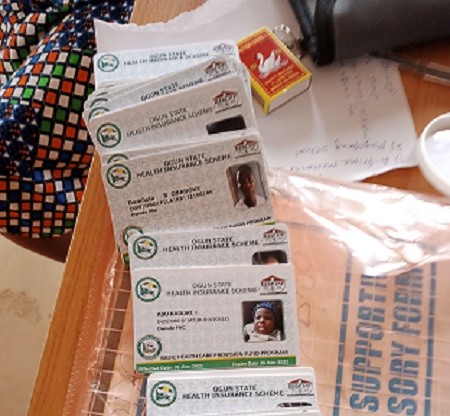
Mrs Aderonke Abodunrin, the In-Charge of the PHC, told our correspondent that she has sacrificed her money, time and effort to look for the enrolees while she has engaged the WDC leadership countless times to help in that regard.
Owode Local Government’s case is similar to that of Papalanto PHC in Ewekoro LGA, but in Owode PHC, cards were not picked, while the ones that were picked are not brought to the centre to access healthcare.
Mrs Victoria Ogundele, a Junior-CHEW, and second in command to the In-Charge of the facility, said she placed calls to so many owners of the yet-to-be picked cards, adding that she has even traced some of the addresses.
“There were phone numbers in the list they gave us. It makes tracking of the enrolees very easy. The effort is paying the leftover cards are not many like it used to be,” She says.
This report is supported by the International Budget Partnership IBP and the International Centre for Investigative Reporting (ICIR)






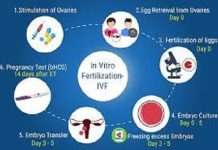






[…] and that she presented the company “because the laptops will be cheaper from them”.In Ala community in Ogun State, the present location of the PHC is a portion of the community hall, and it has been […]